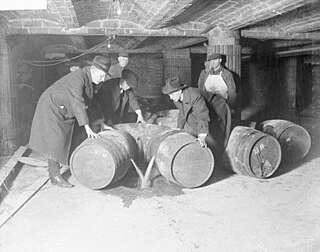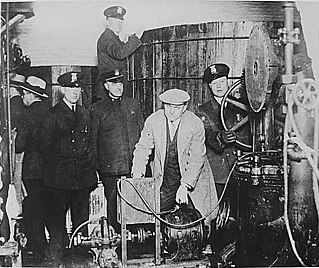Related Research Articles

Prohibition is the act or practice of forbidding something by law; more particularly the term refers to the banning of the manufacture, storage, transportation, sale, possession, and consumption of alcoholic beverages. The word is also used to refer to a period of time during which such bans are enforced.

The Eighteenth Amendment of the United States Constitution established the prohibition of alcohol in the United States. The amendment was proposed by Congress on December 18, 1917, and was ratified by the requisite number of states on January 16, 1919. The Eighteenth Amendment was repealed by the Twenty-first Amendment on December 5, 1933. As of 2020, it is the only amendment to be repealed.

The National Prohibition Act, known informally as the Volstead Act, was enacted to carry out the intent of the 18th Amendment, which established prohibition in the United States. The Anti-Saloon League's Wayne Wheeler conceived and drafted the bill, which was named for Andrew Volstead, Chairman of the House Judiciary Committee, who managed the legislation.

The Labor Management Relations Act of 1947, better known as the Taft–Hartley Act, is a United States federal law that restricts the activities and power of labor unions. It was enacted by the 80th United States Congress over the veto of President Harry S. Truman, becoming law on June 23, 1947.

The Twenty-first Amendment to the United States Constitution repealed the Eighteenth Amendment to the United States Constitution, which had mandated nationwide prohibition on alcohol. The Twenty-first Amendment was proposed by Congress on February 20, 1933, and was ratified by the requisite number of states on December 5, 1933. It is unique among the 27 amendments of the U.S. Constitution for being the only one to repeal a prior amendment, as well as being the only amendment to have been ratified by state ratifying conventions.

The Blaine Act, formally titled Joint Resolution Proposing the Twenty-First Amendment to the United States Constitution, is a joint resolution adopted by the United States Congress on February 20, 1933, initiating repeal of the 18th Amendment to the United States Constitution, which established Prohibition in the United States. Repeal was finalized when the 21st Amendment to the Constitution was ratified by the required minimum number of states on December 5, 1933.

The Bureau of Prohibition was the federal law enforcement agency formed to enforce the National Prohibition Act of 1919, commonly known as the Volstead Act, which elaborated upon the 18th Amendment to the United States Constitution regarding the prohibition of the manufacture, sale, and transportation of alcoholic beverages. When it was first established in 1920, it was a unit of the Bureau of Internal Revenue. On April 1, 1927, it became an independent entity within the Department of the Treasury, changing its name from the Prohibition Unit to the Bureau of Prohibition. In 1930, it became part of the Department of Justice. By 1933, with the Repeal of Prohibition imminent, it was briefly absorbed into the FBI, or "Bureau of Investigation" as it was then called, and became the Bureau's "Alcohol Beverage Unit," though, for practical purposes it continued to operate as a separate agency. Very shortly after that, once Repeal became a reality, and the only federal laws regarding alcoholic beverages being their taxation, it was switched back to Treasury, where it was renamed the Alcohol Tax Unit.
A repeal is the removal or reversal of a law. There are two basic types of repeal, a repeal with a re-enactment of the repealed law, or a repeal without any replacement.

John Morris Sheppard was a Democratic United States Congressman and United States Senator from Texas. He authored the Eighteenth Amendment (Prohibition) and introduced it in the Senate, he is referred to as "the father of national Prohibition."
The repeal of Prohibition in the United States was accomplished with the passage of the Twenty-first Amendment to the United States Constitution on December 5, 1933.

Pauline Morton Sabin was a prohibition repeal leader and Republican party official. She was born in Chicago, Illinois and she was a New Yorker who founded the Women's Organization for National Prohibition Reform (WONPR). Sabin was very active in politics and known for her social status and charismatic personality. Sabin's efforts were a significant factor in the repeal of Prohibition.
The Crusaders was an organization founded to promote the repeal of prohibition in the United States. The executive board consisted of fifty members, including Alfred Sloan, Jr., Sewell Avery, Cleveland Dodge, and Wallage Alexander. They wanted the government to create stronger laws regarding drunkenness.
The Moderation League of New York was an organization founded in 1923 in opposition to prohibition.
The original Voluntary Committee of Lawyers (VCL) was founded in 1927 to bring about the repeal of prohibition and the Volstead Act. The VCL provided legal support for the Association Against the Prohibition Amendment, an umbrella organization that opposed prohibition. With its urging, the American Bar Association called for repeal in 1928. Under the leadership of Joseph H. Choate, Jr., lawyers in every state were actively involved in working to bring about repeal, which occurred in 1933. At that time, the VCL closed its books and ceased to exist.

The National Commission on Law Observance and Enforcement was a committee established by the U.S. President, Herbert Hoover, on May 20, 1929. Former attorney general George W. Wickersham (1858–1936) chaired the 11-member group, which was charged with surveying the U.S. criminal justice system under Prohibition and making recommendations for public policy.

Jouett Shouse was an American lawyer, newspaper publisher, and leading Democratic politician. A conservative, he was best known for opposing the New Deal in the 1930s.
The Association Against the Prohibition Amendment was established in 1918 and became a leading organization working for the repeal of prohibition in the United States. It was the first group created to fight Prohibition, also known as the 18th Amendment. The group was officially incorporated on December 31, 1920. Its activities consisted of meetings, protests, and distribution of informational pamphlets and it operated solely upon voluntary financial contribution. Due to low amount of financial contributions, the Association was largely stagnant until prominent members joined in the mid-1920s.

Augustus Owsley Stanley I was an American politician from Kentucky. A member of the Democratic Party, he served as the 38th Governor of Kentucky and also represented the state in both the U.S. House of Representatives and the U.S. Senate. From 1903 to 1915, Stanley represented Kentucky's 2nd congressional district in the House of Representatives, where he gained a reputation as a progressive reformer. Beginning in 1904, he called for an antitrust investigation of the American Tobacco Company, claiming they were a monopsony that drove down prices for the tobacco farmers of his district. As a result of his investigation, the Supreme Court of the United States ordered the breakup of the American Tobacco Company in 1911. Stanley also chaired a committee that conducted an antitrust investigation of U.S. Steel, which brought him national acclaim. Many of his ideas were incorporated into the Clayton Antitrust Act.

Prohibition in the United States was a nationwide constitutional ban on the production, importation, transportation, and sale of alcoholic beverages from 1920 to 1933.

The Woman's Christian Temperance Union Administration Building is a historic building in Evanston, Illinois, United States. It has served as the publishing house and national headquarters of the Woman's Christian Temperance Union since its construction in 1910. The organization had an important role in the national discussion on prohibition and women's suffrage.
References
- Kyvig, David E. (1979). Repealing National Prohibition. Chicago: University of Chicago Press. ISBN 0-226-46641-8.